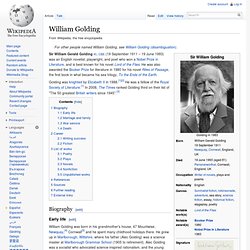

Friedrich Hölderlin. Johann Christian Friedrich Hölderlin (German: [ˈjoːhan ˈkʁɪsti.aːn ˈfʁiːdʁɪç ˈhœldɐliːn]; 20 March 1770 – 7 June 1843) was a major German lyric poet, commonly associated with the artistic movement known as Romanticism.
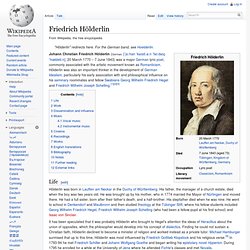
Hölderlin was also an important thinker in the development of German Idealism, particularly his early association with and philosophical influence on his seminary roommates and fellow Swabians Georg Wilhelm Friedrich Hegel and Friedrich Wilhelm Joseph Schelling.[1][2][3] Life[edit] Hölderlin was born in Lauffen am Neckar in the Duchy of Württemberg. His father, the manager of a church estate, died when the boy was two years old. He was brought up by his mother, who in 1774 married the Mayor of Nürtingen and moved there. As a tutor in Frankfurt from 1796 to 1798 he fell in love with Susette Gontard, the wife of his employer, the banker Jakob Gontard.
The small tower in the middle was the home of Hölderlin in his last years. L. Ron Hubbard. Lafayette Ronald Hubbard (March 13, 1911 – January 24, 1986), better known as L.
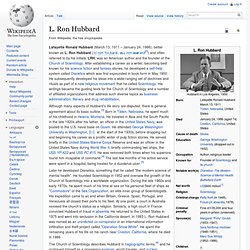
Ron Hubbard (/ɛl rɒn ˈhʌˌbərd/, ELL-ron-HUB-ərd[2]) and often referred to by his initials, LRH, was an American author and the founder of the Church of Scientology. After establishing a career as a writer, becoming best known for his science fiction and fantasy stories, he developed a self-help system called Dianetics which was first expounded in book form in May 1950.
He subsequently developed his ideas into a wide-ranging set of doctrines and rituals as part of a new religious movement that he called Scientology. His writings became the guiding texts for the Church of Scientology and a number of affiliated organizations that address such diverse topics as business administration, literacy and drug rehabilitation. Victor Hugo. Victor Marie Hugo (French pronunciation: [viktɔʁ maʁi yɡo]; 26 February 1802 – 22 May 1885) was a French poet, novelist, and dramatist of the Romantic movement.
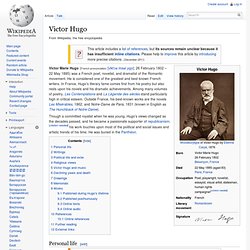
He is considered one of the greatest and best known French writers. In France, Hugo's literary fame comes first from his poetry but also rests upon his novels and his dramatic achievements. Among many volumes of poetry, Les Contemplations and La Légende des siècles stand particularly high in critical esteem. Outside France, his best-known works are the novels Les Misérables, 1862, and Notre-Dame de Paris, 1831 (known in English as The Hunchback of Notre-Dame). Though a committed royalist when he was young, Hugo's views changed as the decades passed, and he became a passionate supporter of republicanism;[citation needed] his work touches upon most of the political and social issues and artistic trends of his time.
Albert Camus. Albert Camus (French: [albɛʁ kamy] ( Camus did not consider himself to be an existentialist despite usually being classified as one, even during his own lifetime.[1] In an interview in 1945, Camus rejected any ideological associations: "No, I am not an existentialist.
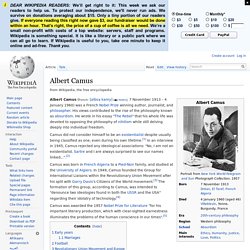
Sartre and I are always surprised to see our names linked... ".[2] Camus was born in French Algeria to a Pied-Noir family, and studied at the University of Algiers. In 1949, Camus founded the Group for International Liaisons within the Revolutionary Union Movement after his split with Garry Davis's Citizens of the World movement.[3] The formation of this group, according to Camus, was intended to "denounce two ideologies found in both the USSR and the USA" regarding their idolatry of technology.[4] Camus was awarded the 1957 Nobel Prize for Literature "for his important literary production, which with clear-sighted earnestness illuminates the problems of the human conscience in our times".[5] Ayn Rand. Literary critics received Rand's fiction with mixed reviews,[6] and academia generally ignored or rejected her philosophy, though academic interest has increased in recent decades.[7][8][9] The Objectivist movement attempts to spread her ideas, both to the public and in academic settings.[10] She has been a significant influence among libertarians and American conservatives.[11] Life[edit] Early life[edit] Rand was born Alisa Zinov'yevna Rosenbaum (Russian: Али́са Зиновьевна Розенбаум) on February 2, 1905, to a Russian Jewish bourgeois[12] family living in Saint Petersburg.
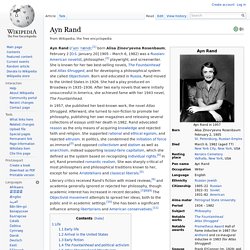
She was the eldest of the three daughters of Zinovy Zakharovich Rosenbaum and his wife, Anna Borisovna (née Kaplan), largely non-observant Jews. The subsequent October Revolution and the rule of the Bolsheviks under Vladimir Lenin disrupted the life the family had previously enjoyed. Along with many other "bourgeois" students, Rand was purged from the university shortly before graduating. William Golding. Golding was knighted by Elizabeth II in 1988.[1][2] He was a fellow of the Royal Society of Literature.[1] In 2008, The Times ranked Golding third on their list of "The 50 greatest British writers since 1945".[3] Biography[edit] Early life[edit] William Golding was born in his grandmother's house, 47 Mountwise, Newquay,[4] Cornwall[5] and he spent many childhood holidays there.
